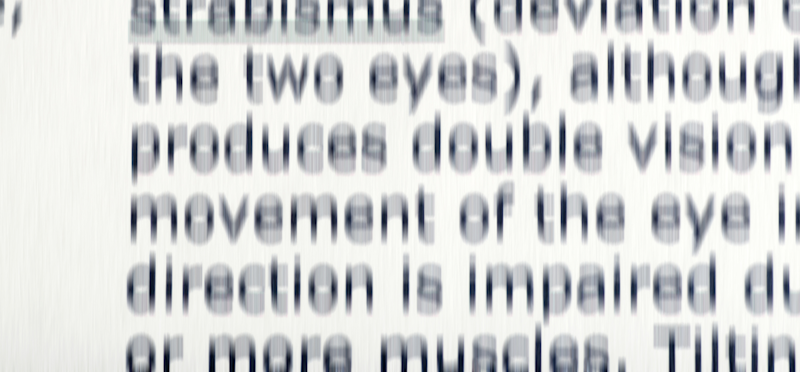I became convinced after about four years of tutoring phonics that many struggling readers are dealing with unaddressed vision issues that make the act of reading, and of learning to read, difficult for them. If you teach in the lower grades, you almost certainly have seen many such students, although you might not have realized it.
Here, I want to describe four kids, an older child already through the learning to read phase of school, a younger student struggling during first grade after being deemed one of the best readers in kindergarten, a kindergarten child resistant to phonics instruction, and a baby who almost certainly would have struggled with reading had his visual system not corrected. I'll start with the oldest child first, because those like him are struggling the most and need to be recognized quickly so their needs can be addressed before they become failures in school.
#1 - David's Story - My First Vision Therapy Referral
This one was written long ago. It's about my first referral to vision therapy and at the time I had taken detailed notes on his reading behavior. I suspect that most 4th to 6th grade teachers have had at least one student like this in their class every year since they started teaching.
When you read David's Story it will open in a new tab. Be sure to read the follow-up article, David Returns, which you can either open here or from David's Story itself.
If you're back after reading about David, I hope you have a better understanding of what behaviors to look for in a vision-challenged child. Such students will have already been to an optometrist, so it's not that they have poor visual acuity. Instead, they have poorly-developed vision skills.
To help determine if that's the problem facing one of your struggling readers, take a look at the Vision Assessment Checklist here on the website.
#2 - My Toughest Vision Therapy Referral Ever
And then there was the girl I worked with the summer after first grade. I'll call her Susan. By the time I worked with Susan I was well aware of many of the symptoms that a child with poorly-developed vision skills displayed. I saw none of those with Susan. She was bright, eager to learn, not resistant at all to instruction, all in all a great kid. She was also, by the way, one of the best readers leaving kindergarten.
But she couldn't retain the information in my phonics curriculum. We'd work on a lesson one day and it would be gone the next time we met. It was frustrating for both of us, and for the mom who sat in on the lessons and worked with her on the homework.
Here's what my experience with Susan had me doing:
- printing out new materials with pictures to help her understand
- trying existing phonics games, ones I didn't usually need
- coming up with new games to work on her phonics knowledge
- having her do more oral reading, hoping something would click
- worrying about her constantly, trying to come up with something that might work
In other words, her resistance to my phonics curriculum had me searching for alternative ways to both get the phonics information into her head and, more importantly, to get her reading.
Finally, I made the toughest referral to vision therapy I ever made, before or since. I told her mother that I saw no signs of visual distress, that there was no evidence of a genetic component based on what I'd been told, that no siblings or close relatives struggled learning to read. None of the items on the Vision Assessment Checklist that I'd developed seemed to apply to Susan except that she was no longer willingly reading and she couldn't pick up phonics instruction.
While warning her mom that even the initial exam was likely to cost several hundred dollars, I told her she should consider seeing a developmental optometrist in our area and have her daughter's vision skills evaluated, which she did.
This isn't a story about Susan getting vision therapy and later becoming the Valedictorian. In fact, I didn't work with her again after vision therapy. Susan was found to have problems with her vision skills, got vision therapy, and following that her mother was satisfied with her progress in school. She went on to graduate, and is now an adult with a good job.
And, a year or so after working with Susan, a relative told me that her father had a lot of trouble learning to read. Had I known that from the outset, I would have made the referral as soon as Susan's resistance to phonics instruction became evident.
The lesson I took from the experience is that undetected vision skills issues can drive teachers to look for alternative instructional methods. You want a child to learn to read and you'll do whatever it takes until you finally give up because you're out of ideas. Maybe the next teacher will have more success.
I believe that students like Susan are the reason that the reading war between phonics advocates and whole language advocates has continued decade after decade. And, until we recognize the need to address vision skills deficits in our students, that reading war will continue because those deficits often make a child highly resistant to utilizing phonics instruction. So teachers try something else, eventually including whole language methods. And the cycle begins anew.
#3 - My Youngest Referral
This one will be shorter. Steven wasn't even in kindergarten yet, but he was first-born and his parents encouraged reading, like the parents of many first-born children. I knew the family and played around a bit with some basic code phonics, just letter-sound relationships at the simplest level. But Steven just couldn't seem to get it. That went on, in a very casual way, for a year or so with the same result.
Then, one day, Steven's younger sister showed an interest in what I was again showing him, and it was obvious that she was catching on, although her older brother wasn't.
At that point, and for a couple of years after, I mentioned the possibility that Steven might have a problem with his vision skills. Also, I knew that someone in the family tree had struggled with early reading instruction. This went on for a couple of years of schooling, with Steven doing okay, but still reluctant to read. Finally, his parents took him to a developmental optometrist and he was found to need vision therapy, which he got, at the cost of a few thousand dollars.
A few years later, I asked the parents whether vision therapy had helped him. I got a non-committal answer along the lines of not knowing whether it had been worth it. Later, I asked Steven if he thought it helped. His answer sticks with me: "Well, I don't get headaches when I read anymore."
The lesson I drew from that experience is that if you're not experiencing the trauma personally, you tend to forget sometimes. Also, that if a child isn't able to pick up on phonics instruction, the problem is more likely to lie in the vision realm than in the auditory realm. But that's an observation worth a separate article.
#4 - A Baby's Vision Story
A few years ago I observed a child, then three months old, whose visual system was highly suspect. His eye control was very poor. He was not even following with his eyes the people in his immediate family. Furthermore, he appeared exceptionally "bug-eyed" to the extent that people would actually comment on it.
I was concerned and encouraged the family to supplement him with vitamin D3 because of other reading I'd been doing. Less than two months later, at about age 4 1/2 months, I saw that same child and the changes in his visual system were dramatic. He was following people with his gaze, and the "bug-eyed" look had diminished considerably. A few months later that look had completely disappeared, and at age 3 1/2, he appeared to be a normally functioning child with an avid interest in books besides.
Did vitamin D3 supplementation make a difference? I know his mother thought so, since she said at the time that she noticed a marked difference in his visual behavior within two weeks of beginning supplementation. Would he have been a struggling reader without the supplementation of vitamin D3? I don't know, but I was certainly concerned that his visual system was not developing at a normal rate at the time.
I realize this Vitamin D3 talk seems a bit out of place here. Dr. John Cannell wrote a paper in 2008 titled "Autism and Vitamin D" and it made sense to me. Since then I've done a lot of reading on issues that I would describe as ranging from learning disabled, to ADHD, to dyslexia, to Asperger's to autism and have concluded that there are enough similarities that they might be part of a spectrum of issues that I would describe as developmental delay, possibly across several fronts.
That led to me wondering whether one of those developmental delays is often in vision skills, especially since the symptoms of a vision skills problem overlap significantly with both ADHD symptoms and LD/dyslexia symptoms.
The lesson I drew from this baby's story is that if one is concerned by a family history of reading issues, or of vision skills issues, take care to ensure that neither the expectant mother nor her baby are lacking key nutrients, including vitamin D3.
Parents, Teachers, Take Notice
Vision skills issues are rarely noticed until a child has suffered significant trauma in school. Yet, as I've described above in four quite-different situations, they can be detected if we are looking for them, even at a very young age.
I'm a strong phonics advocate, even to the point of once believing that phonics instruction would solve most reading problems. I still believe that it's essential knowledge to teach a child, but I also know that some children will always struggle with phonics until their visual skills deficits are addressed, usually with vision therapy.
And, until other phonics advocates also come to realize that fact, many children will continue to suffer trauma in school. Not being able to learn to read is not fun; it's traumatic.




